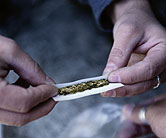
TUESDAY, March 1 (HealthDay News) — Smoking marijuana as a teenager or young adult raises your risk of having psychotic symptoms later in life, a new Dutch study shows.
“This cements much more firmly the reality that marijuana use in adolescence is a risk factor, along with the other genetic, environmental and socioeconomic risk factors, for developing psychosis,” said Dr. Kathryn Kotrla, associate dean and professor of psychiatry and behavioral sciences at the Texas A&M Health Science Center College of Medicine in Round Rock.
The findings, reported in the March 1 issue of the BMJ, come just weeks after Australian researchers reported on a connection between smoking marijuana and an onset of psychosis 2.7 years earlier than those who hadn’t used the drug.
This latest study, led by Jim van Os from Maastricht University, seems to go one step further by showing that marijuana use actually precedes the onset of symptoms, suggesting a possible cause-and-effect relationship.
Some 16 million people in the United States alone use marijuana regularly, and most started smoking in their teens. It is the third most widely used addictive substance after tobacco and alcohol.
The new findings are based on data on about 2,000 individuals in Germany who were 14 to 24 years old when they enrolled in the study, and who were then followed for 10 years.
None of the participants had ever tried marijuana before entering the study, nor had any experienced psychotic symptoms.
The researchers found that those who started smoking pot during the 10 years of the trial had double the risk of developing psychotic symptoms such as hallucinations, even after adjusting for factors such as age, sex, socioeconomic status, other drug use and other psychiatric diagnoses.
And the more persistent the use, the more persistent the symptoms.
The researchers did caution about several possible limitations, however, including self-reported data and the lack of direct adjustment for a family history of psychosis.
Michael Rice, a professor and psychiatric nurse practitioner at the University of Nebraska Medical Center College of Nursing in Omaha, noted that the participants were not actually diagnosed with a psychotic disorder, only symptoms.
“This is not schizophrenia, but psychotic symptoms [but] it does determine that this is potent stuff that has the effect of eventually creating hallucinatory or psychotic experiences,” he said.
But, Rice added, “it’s still psychosis and it’s totally preventable.”
Dr. Kathryn Kotrla, associate dean and professor of psychiatry and behavioral sciences at Texas A&M Health Science Center College of Medicine in Round Rock, likened this to a “perfect storm,” given that people are more likely to use pot when they’re young, which is precisely when their brains are most vulnerable.
“We are identifying so many risk factors, the genetics, the child abuse, the complexity of an urban environment, when this adds up you can move towards thinking about particularly vulnerable individuals and thinking about targeted interventions,” she said. “If you have a family history of mental illness, using marijuana is not such a great idea.”
More information
The National Institute on Drug Abuse has more on marijuana.

